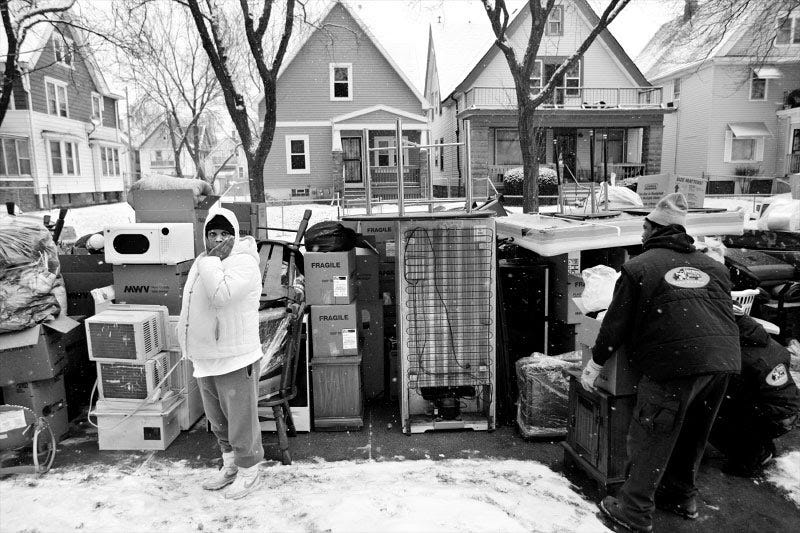
Thank you for reading another edition of Contention! This one should only take five minutes to read. If you like it, please follow us on Twitter and subscribe to receive this in your inbox.
Now that Silicon Valley and Wall Street have combined to stave off a Reddit-fueled financial crisis, the U.S. economy seems to be left with just the emergencies it faced two weeks ago. Among the most pressing: swelling rental debt threatening to drive millions of families out of their homes.
This crisis is especially bad news for the U.S. economy because it pits low-income workers against powerful property owners, and choosing the rich guys this time is, objectively, the wrong choice. History, however, suggests that the country’s decision-makers might choose crisis over compassion anyways.
At least 19 million Americans in more than eight million households have not paid their rent in recent months. On average these families each owe $6,000 -- or they did when Moody’s made that estimate two months ago, the total is now higher -- an aggregate outstanding debt of $70 billion. Eviction moratoriums at the federal, state, and local levels have kept people in their homes for now, but observers expect an “avalanche of evictions” sooner or later.
Policymakers have responded with these moratoriums as well as rental assistance programs, cash transfers from governments to landlords to buy workers more time to get their incomes back on track.
But landlords and renters have very different perspectives on their shared crisis, and the policies so far favor the landlord perspective in unsustainable ways. First and most obvious: a rental property is a source of income for the landlord and a home for the renter. Landlords want rental assistance programs to reduce their loss of income; renters need them to protect their housing stability.
The proper way to maximize satisfaction of both of these interests would be to treat rental properties as impaired assets. Investors assess rental property values through the direct capitalization method: take all the rent collected, subtract costs, and divide by a “capitalization rate” closely tied to interest rates. Less rent means less value, so landlords should have to settle for less and more families should get access to assistance.
But right now only 24-35% of rental assistance programs are expecting landlords to make any concessions. The state has excluded basic market considerations from these policies -- pissing off landlords is bad politics. The problem is even worse because the concessions that are getting made are disproportionately falling on “mom and pop” landlords -- individual or small family property owners.
All landlords are net drains on the economy. “Rent” in an economic sense is broader than just the cost of housing: it means any premium charged for access to a restricted good or service. Rents do not pay for any added value -- that’s why the costs of maintaining a rental property get netted out in the direct capitalization method -- it is a privilege claimed on the basis of title alone.
That said, smaller landlords tend to provide much more affordable housing on average, and their disproportionate bankruptcy during the crisis means rental property consolidation in the hands of private equity firms. These corporate behemoths are not only much more likely to file eviction claims against their renters, they are already ignoring eviction moratoriums in many communities. The federal government has provided zero resources for enforcing its policy.
Not only will this mean accelerating homelessness for distressed workers, private equity firms and other large corporate landlords accelerate gentrification in low-income communities. Already COVID-driven high-income migration has meant double-digit rent increases in previously affordable cities. If an economic recovery really does come, it may not make up for the ground working people will lose, exacerbating social crises regardless of GDP growth.
What can be done? There are only two real options: write down the debt or pay it off. Writing it down would mean a big blow to rental property values and a bad political precedent for working and poor people. Policymakers are focused instead on how they will collect the rent.
One possible solution: civil debt conversion, which would make the rental debt more like a credit card balance -- it would remain in place, but the landlords would not be able to evict. This eliminates the immediate crisis of tens of millions of new homeless people all hitting the streets at once, but it is still a massive blow to the balance sheets of already struggling families. New income gains would get sucked away by parasitic debt collectors, again undermining any recovery to come.
So once again those at the bottom of the economy get to deal with market forces while those at the top get a bailout and a bargain opportunity, this time conveniently hidden behind layers of cynical bureaucratic charity. If almost all our problems and policies are lose-lose is it too much to ask if the collapse has already begun?
Disclaimer
Our only investment advice: No romance without finance.
Contact us with feedback, questions, or any stories we might have missed.



